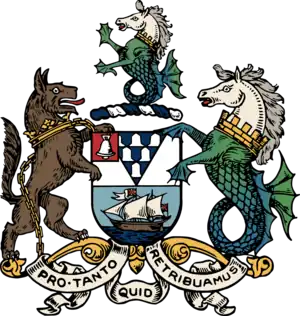Belfast City Cemetery
Belfast City Cemetery (Irish: Reilig Chathair Bhéal Feirste) is a large cemetery in west Belfast, Northern Ireland. It lies within the townland of Ballymurphy, between Falls Road and Springfield Road, near Milltown Cemetery. It is maintained by Belfast City Council. Vandalism in the cemetery is widespread.[1]
| Belfast City Cemetery | |
|---|---|
_-_geograph.org.uk_-_812741.jpg.webp) | |
| Details | |
| Established | 1869 |
| Location | |
| Country | Northern Ireland, UK |
| Type | Public |
| No. of graves | 226,000 |
History
Following the Belfast Burial Ground Act (1866), the cemetery was opened on August 1, 1869 as a cross denominational burial ground for the people of Belfast, a fast-growing Victorian town at the time. The land was purchased from Thomas Sinclair. The cemetery features cast iron fountains and separate Protestant and Catholic areas, divided by a sunken wall. Many of Belfast's wealthiest families have plots in the cemetery, particularly those involved in the linen trade. Since its opening in 1869 around 226,000 people have been buried in the cemetery.
There has been an area set aside for Belfast's Jewish residents since 1874.[2] In this area is a memorial to Daniel Joseph Jaffe. Daniel Jaffe was the father of Otto Jaffe, a Jewish linen exporter and former Lord Mayor of Belfast. Above the old Jewish entrance to the cemetery, Hebrew writing can clearly be identified.
In 1916 an area was dedicated to soldiers who died serving in World War I, when 296 Commonwealth service personnel were buried in the cemetery. Those whose graves could not be marked by headstones are listed on Screen Wall memorial in Plot H.[3] Many of the United States Army personnel killed in the sinking of HMS Otranto in 1918 were buried in the graveyard. After the war their bodies were exhumed and repatriated to the United States.
In World War II, 274 Commonwealth service personnel, 5 of them unidentified, were buried in the cemetery, besides 3 Norwegian nationals whose graves are also maintained by the Commonwealth War Graves Commission.[3]
Developments
As the frequent target of vandalism, many of the British Army soldiers' headstones were moved to Sir Thomas and Lady Dixon Park. In 2012, continuing vandalism of the World War I Screen Wall has led to proposals to move it to another part of the cemetery.[4] Due to its historical importance, the cemetery is a popular tourist attraction in Belfast, with guided tours available.
On 8 April 2006, Denis Donaldson was buried in the cemetery. Donaldson was a former IRA member and Sinn Féin politician. He was killed shortly after being named as a British spy. His burial in the City Cemetery rather than in the republican plot of Milltown Cemetery was significant, as it was seen as a final snub by the republican movement.
On 7 August 2012, an image purportedly depicting the face of Jesus (cf. Pareidolia) appeared on a tree stump in the cemetery.[5]
As part of a major heritage project the cemetery began a major upgrade in the early 2020s. This included the building of a visitor centre which has various displays about the history of the cemetery.[6]
Notable interments
- Sir Robert Anderson, 1st Baronet - politician, former Lord Mayor of Belfast.
- Robert Hugh Hanley Baird - businessman
- Margaret Byers - educator, activist, social reformer, missionary, and writer
- Sir George Clark, 1st Baronet - shipbuilder
- Samuel Cleland Davidson - inventor and founder of Belfast Sirocco Works
- Denis Donaldson - Former IRA member and Sinn Féin politician; killed as a British spy.
- Vere Henry Louis Foster - educationist and philanthropist
- Tom Gallaher - tobacco merchant
- Edward Harland - shipbuilder
- James Henderson - Unionist politician, former Lord Mayor of Belfast.
- John Hopkinson - physicist
- Daniel Joseph Jaffe - Built Belfast's first synagogue; father of Otto Jaffe, former Lord Mayor of Belfast.
- Florence Augusta Lewis - mother of C.S. Lewis
- Robert Wilson Lynd - author.
- William Henry Lynn - architect
- Thomas Macknight - Political author and biographer.
- Francis Maginn - missionary
- Valentine McMaster - Victoria Cross (VC) recipient (Indian Mutiny).
- Bernard McQuirt - VC recipient, Indian Mutiny. (Grave in pauper plot unmarked; commemorative headstone at Donaghcloney, County Armagh).
- Rinty Monaghan - boxer
- William Pirrie, 1st Viscount Pirrie
- Elisha Scott - football player
- Robert Thompson - politician
- Sam Thompson - playwright
- William Whitla - physician and politician
References
- "Belfast cemetery vandalised so often people don't want buried in it". 18 July 2017.
- Irish Gravestone Inscriptions, Tracing your Irish Ancestors: Introduction
- http://www.cwgc.org/find-a-cemetery/cemetery/73327/BELFAST%20CITY%20CEMETERY CWGC Cemetery Report.
- "Vandals may force memorial move". BBC News. 17 April 2012.
- "Face of Jesus Christ appears on tree stump at Belfast cemetery". The Belfast Telegraph. Independent News & Media. 9 August 2012. Retrieved 9 August 2012.
- "City cemetery visitor centre now open". Belfast City Council. Retrieved 12 June 2023.
Further reading
- Hartley, Tom (2014). Belfast City Cemetery: the history of Belfast, written in stone (2nd ed.). Belfast: Blackstaff Press. ISBN 978-0-85640-924-0.
External links
 Media related to Belfast City Cemetery at Wikimedia Commons
Media related to Belfast City Cemetery at Wikimedia Commons- Belfast City Cemetery Archived 2007-09-29 at the Wayback Machine
